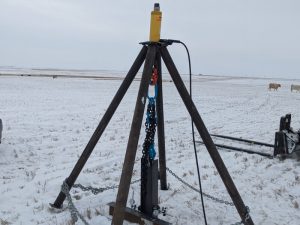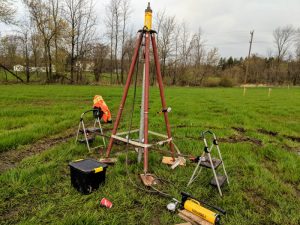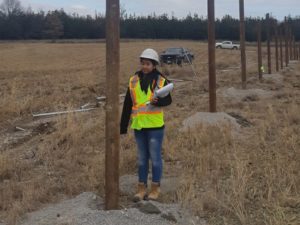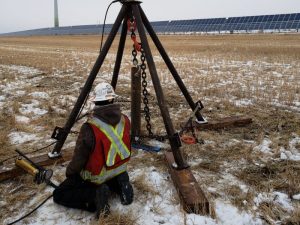A geotechnical report for a solar project usually includes results from the geotechnical investigation, the pile testing and design recommendations, and the pre-production load testing. The report begins with a basic background review of the site. It will then include information on the geotechnical investigation procedures such as the field investigation program, piezometer installation, laboratory testing program, and field resistivity testing.
Subsurface conditions are also detailed in length including information on the overburden, bedrock and other obstructions, and groundwater and borehole stability observations. Most if not all geotechnical reports conclude with a recommendations section which identifies general recommendations such as site preparation, excavations, groundwater control, and material reuse, backfill, and compaction.
The geotechnical recommendations section also includes frost considerations (such as soil frost susceptibility, frost penetration depths, and water availability), seismic site class, and recommendations for foundation design (including which pile is recommended such as driven piles or helical piles).
Other information that is found in a geotechnical report for a solar project includes the groundwater and soil stability, corrosivity analysis, thermal resistivity testing, liquefaction susceptibility, and other hydrogeological considerations such as an evaluation of impacts from sediment erosion control, contamination of aquifers, and/or the drawdown of water wells and water features. Construction monitoring and design review are also included.
Each geotechnical report will vary based on the scope of the project, which is why the initial site survey and test plan are so important. Depending on what is found in the initial screening, the geotechnical report will have different information and recommended designs.
 1. Racking Induced Loads
1. Racking Induced Loads 1. Subsurface Investigation
1. Subsurface Investigation Our expertise and experience ensures efficient construction Quality Analysis (QA) and Quality Control (QC) of your solar array foundations. When designing a solar foundation for cold climates, QA/QC ensures your project is built to last.
Our expertise and experience ensures efficient construction Quality Analysis (QA) and Quality Control (QC) of your solar array foundations. When designing a solar foundation for cold climates, QA/QC ensures your project is built to last. PRI Engineering is one of the few geotechnical engineering firms in North America offering both pre- and post-production testing. Production testing assures you that our initial analysis and design recommendations are of the highest quality and result in durable structures that last throughout their intended lifespan.
PRI Engineering is one of the few geotechnical engineering firms in North America offering both pre- and post-production testing. Production testing assures you that our initial analysis and design recommendations are of the highest quality and result in durable structures that last throughout their intended lifespan.

